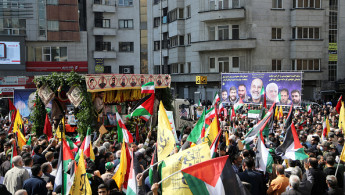Israel 'in complete panic' over Syria attack response: Iran
An adviser to Iran's supreme leader said Saturday that Israel is panicking over a possible retaliatory response from Iran after a strike in Syria which killed members of its Revolutionary Guards.
"It has been a week that the Zionists are in complete panic and are on alert," Yahya Rahim Safavi, senior adviser to Ayatollah Ali Khamenei, was quoted as saying by the ISNA news agency.
"They don't know what Iran wants to do, so they and their supporters are terrified," ISNA quoted him as saying.
Tehran has blamed Israel and vowed to avenge the April 1 air strike on Damascus that levelled the Iranian embassy's consular annex, killing seven members of its Islamic Revolutionary Guard Corps (IRGC), including two generals.
Following the strike, which Israel has not commented on, its army announced a leave suspension. It also said officials decided to increase manpower and draft reserve soldiers to operate air defences.
"This psychological, media and political war is more terrifying for them than the war itself, because they are waiting for an attack every night and many of them have fled and gone to shelters," Safavi added.
Britain-based war monitor the Syrian Observatory for Human Rights said the April 1 strike killed 16 people. Among the dead were generals Mohammad Reza Zahedi and Mohammad Hadi Haji Rahimi who were senior commanders in the Quds Force, the IRGC's foreign operations arm.
Zahedi, 63, was the most senior Iranian soldier killed since a United States missile strike at Baghdad airport in 2020 killed Quds Force chief General Qasem Soleimani.
The strike in Damascus took place against the backdrop of Israel's war in Gaza, which has killed at least 33,686 people as of Saturday - mostly women and children.
Israel's military campaign has flattened much of the territory, destroying homes, hospitals and places of worship.
Additionally, Israel's blockade of the territory has exacerbated the humanitarian situation in Gaza, where a famine is looming and diseases are widespread.
Iran does not recognise Israel, and the two countries have fought a shadow war for years.
The Islamic republic accuses Israel of having carried out a wave of sabotage attacks and assassinations targeting its nuclear programme.





 Follow the Middle East's top stories in English at The New Arab on Google News
Follow the Middle East's top stories in English at The New Arab on Google News


